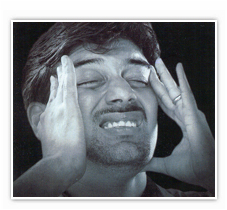| Related Information |
 |
|
|
| |
 |
| |
|
| |
| |
| Contact Us |
Flat 7, Plot 49,
Surya Sadan, First floor, Main Road,
Near Vitthal Mandir, off Sion Circle, Sion (W), Mumbai 400 022
 : + 91 - 98207 71247 : + 91 - 98207 71247
(3.00 pm to 7.00 pm)
 : dr.k.ravishankar@gmail.com : dr.k.ravishankar@gmail.com |
|
|
|
|
 |
|
| |
|
| |
 |
Secondary Headaches are headaches where the underlying cause is identifiable on examination or on investigation. Some of the more sinister causes of secondary headaches are brain tumors, blood vessel anomalies, brain abscesses and infections like meningitis, while some of the less dangerous causes of secondary headaches are sinusitis-associated headaches and temporo-mandibular joint headaches. The salient features of some of the more commonly seen secondary headaches are featured below..
|
|
| |
Medication Overuse Headache
This headache results from overuse of acute headache medications. The initial ‘cure’ can sometimes later become the ‘cause’ of the headache. The offending drugs include both prescription drugs and over-the-counter pain medications. Overuse of combination analgesics containing opioids and ergots and triptans can cause medication overuse headache.
These headaches usually occur daily, and regular use of pain killers and other relief medications over a period of time interferes with the body’s own pain-fighting systems in the brain. Eventually, the person becomes more vulnerable to headache as soon as the effect of the drug starts to wear off. Treatment of this type of headache includes withdrawl of the offending drug under the supervision of a specialist. Inpatient management and detoxification works much better than outpatient treatment for this type of headache.
|
|
 |
| |
Sinusitis - Associated Headache
Sinuses are air-filled cavities within the bones of the skull. Although infection of the sinuses can certainly cause headache, this is not a common cause for chronic headache. It is not too difficult to diagnose this type of headache, as generally there is low-grade fever, a thick, purulent discharge from the nose or at the back of the throat, tenderness over the sinus area-frontal or maxillary i.e. around the eyes and cheeks. Besides sinus infection there can be other abnormalities of the nasal architecture that may lead to recurrent headaches. |
|
 |
| |
Eyestrain Headache
Most headaches are wrongly attributed to or misdiagnosed as Eyestrain headaches. Eyestrain headache can be felt in the forehead or around the eyes. As the term suggests, the trigger usually is overworking the eyes. Persistent eye strain can be caused by untreated vision problems, astigmatism, working in conditions of poor or fluorescent lighting, long periods of focused visual work. Important it is to remember that headaches are not always due to eye problems. |
|
 |
| |
Temporo Mandibular Joint Syndrome
The temporo-mandibular joint or 'TMJ' is the hinge - like joint, where the lower jaw attaches to the skull. When this joint is involved, there may be pain and discomfort in chewing. This pain can sometimes radiate to the head. Usually, the headache is just on one side and continuous. The clue to correct diagnosis is pain centered over the TMJ itself or nearby muscles and worsening of the pain during chewing or yawning. Dental problems can also cause pain that radiates to the head. |
|
 |
| |
Post-Traumatic Headache
Headache is common following injuries to the head and neck. Not only head injuries, but even damage to the cervical spine can end up giving you a headache. Imaging studies may be normal and there may be little or no correlation between the seriousness of the injury and the severity of the headaches. Post-traumatic headache is generally constant and dull rather than episodic. Head injury may occasionally trigger typical migraine attacks and this is called ‘trauma-triggered migraine’.
In addition to headache, other symptoms in the post-traumatic or post-concussion syndrome commonly include faintness, poor memory, inability to concentrate, short attention span, anxiety, insomnia and irritability. After head injury, some people become depressed and lose interest in their usual activities and pleasures. Less common symptoms include ringing in the ears, spinning sensations or vertigo, fatigue, intolerance of alcohol or medications, fainting and sexual difficulties. Adults may not perform as well at work or children may start to fail in school. |
|
 |
| |
Secondary Headaches of A Serious Nature
They constitute only about less than 10% of all headaches but it is important that these causes are ruled out before beginning treatment for head pain. That is why it is always said 'seek medical help if you have persistent headache or if you develop new headaches or if there is a change in the pattern of your headache or if there is a neurological deficit associated with your headache or if there is progressive worsening of your headache'. These are some of the Danger Signals of serious Secondary Headache. |
| |
|
| |
|
|



